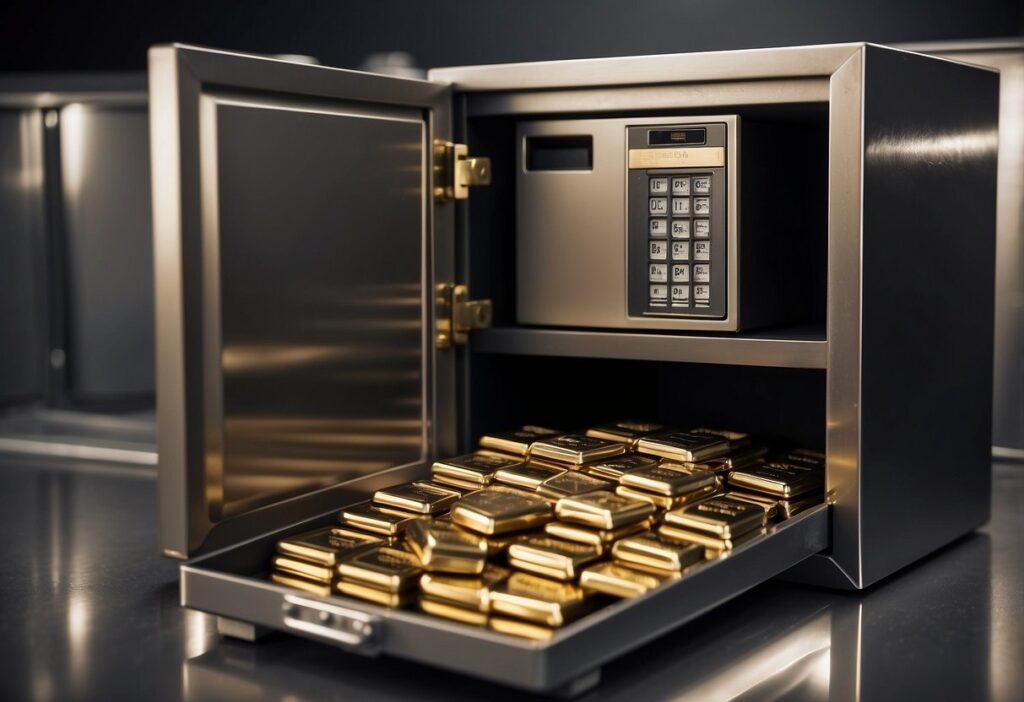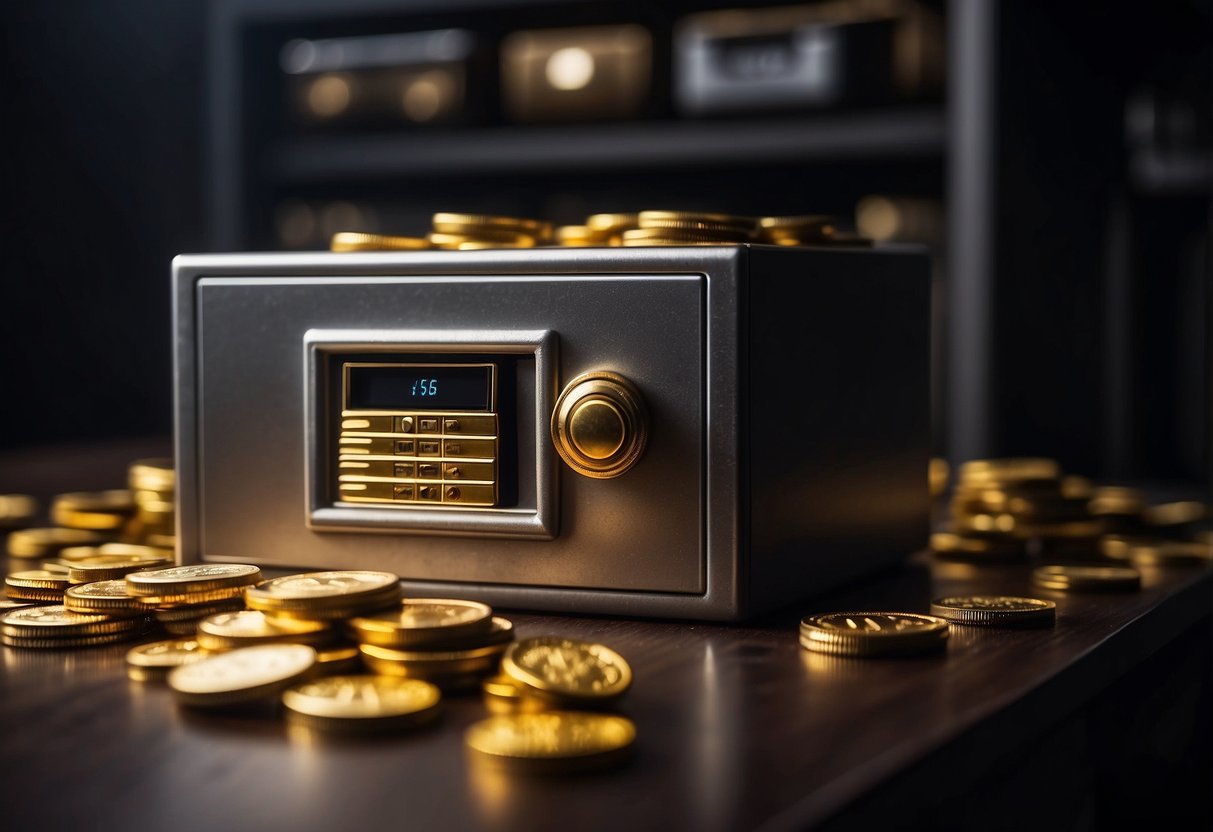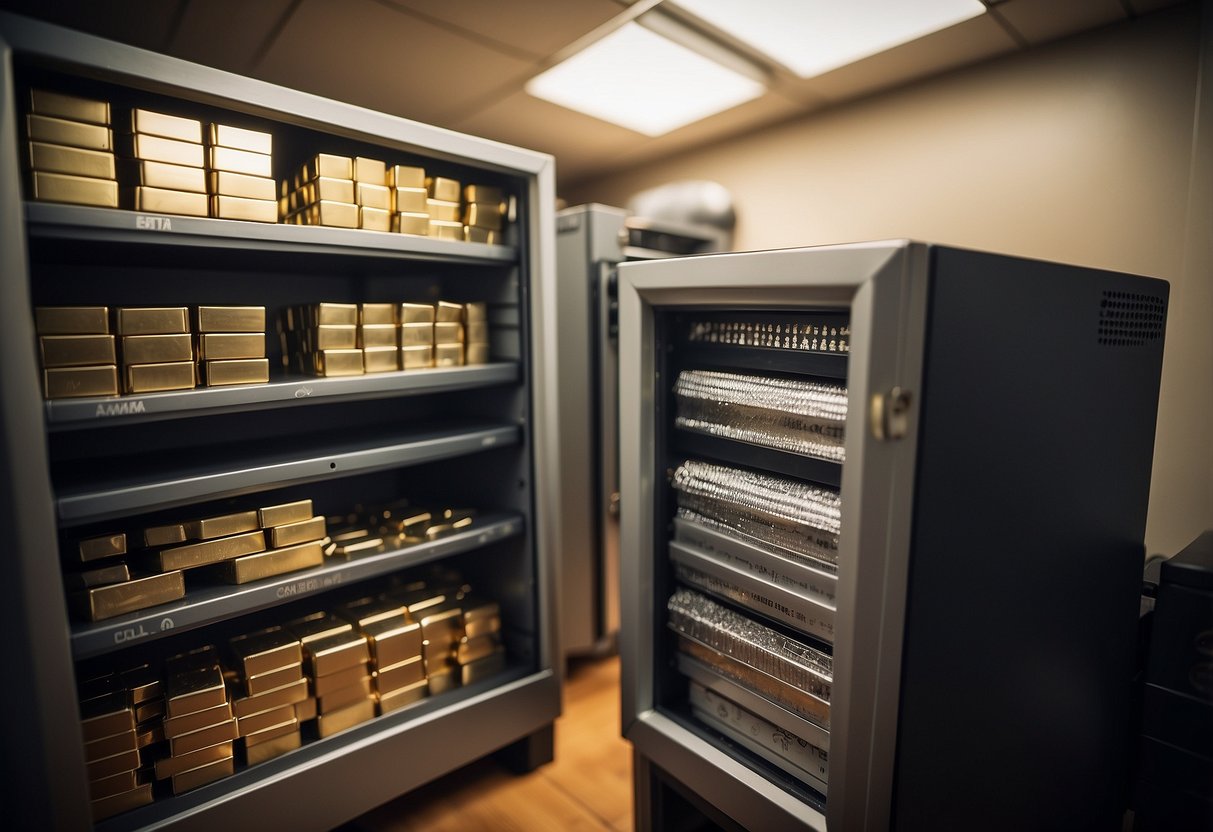
How to Properly Store Gold and Silver Bullion at Home: Expert Tips
Storing gold and silver bullion at home can be a smart and cost-effective way to safeguard your investment. Properly storing these precious metals involves selecting the right spot, using the right materials, and taking security precautions. By ensuring your gold and silver are well-hidden and protected, you reduce the risk of theft while ensuring that your investments are easily accessible when needed.
One should consider the space and weight requirements when storing bullion at home. Silver, for example, takes up much more space than gold for the same dollar value. Gold can be hidden in inconspicuous areas such as wall safes, buried in the garden, or even within furniture. In comparison, storing silver might require larger, more creative hiding places.
Using a safe is one of the most effective ways to store gold or silver at home. Safes can protect against theft and fire. It’s essential to keep information about your storage practices private, only sharing details with trusted family members.
Key Takeaways
- Proper home storage of bullion involves choosing hidden, secure spots.
- Gold takes up less space than silver; plan accordingly.
- Use a high-quality safe for added protection.
Understanding Bullion

Types of Bullion
Bullion refers to precious metals like gold and silver in bulk form, typically bars and coins. Gold bars range in size from small one-gram pieces to large 400-ounce bars. Gold coins, such as the American Eagle or Canadian Maple Leaf, are popular among collectors and investors due to their purity and craftsmanship.
Silver bars can be found in various sizes as well, with common weights being 10 ounces, 100 ounces, and 1,000 ounces. Silver coins, like the American Silver Eagle, are widely traded and known for their specific weight and silver content. The choice between bars and coins often depends on budget, storage preferences, and trading needs.
Importance of Preservation
Preserving bullion properly is crucial to prevent tarnish and damage, which can significantly impact its value. Gold does not tarnish, but it should be stored in airtight containers away from contaminants. Silver, on the other hand, is prone to tarnish and requires more careful handling and storage, such as using sealed plastic bags or capsules.
Investors should consider using a safe or a hidden, inconspicuous spot at home for storage. Reducing exposure to humidity and handling the bullion with clean, dry hands or cotton gloves can help maintain its condition. Implementing these careful storage methods ensures that the bullion retains its aesthetic and intrinsic value over time.
Preparation for Home Storage

Choosing the Right Location
When storing gold at home, selecting a secure location is crucial. Avoid obvious hiding spots like sock drawers or cookie jars. Instead, consider places that are difficult for thieves to find. Good options include hidden wall safes or false-bottom drawers.
The right location should also be fireproof and waterproof to protect your bullion from natural disasters. Steel-wall safes with at least 1/4-inch thickness offer significant protection.
Another factor to consider is privacy. Keep the information about your storage area limited to a few trusted individuals. This limits the risk of someone discovering your valuable assets.
Storage Space Considerations
Gold and silver take up a significant amount of space compared to their value, especially silver, which is currently 84% larger in volume than gold. This means that if you’re storing a considerable amount, you’ll need adequate space.
Invest in high-quality safes that are designed for storing precious metals. These safes are often fireproof and waterproof and have steel walls to offer robust protection.
Consider whether you want to store all your bullion in one place or multiple locations around your home. Distributing your bullion can minimize loss in case of theft. Hidden compartments or even burying some of your bullion in a secure part of your property can serve as additional security measures.
Properly planning for storage space ensures that your investments are both safe and easily accessible when needed.
Security Measures for Home Storage

Selecting Safes and Vaults
Choosing the right safe is critical. A home safe with a robust build and a combination lock is a good start. Floor safes offer added protection as they are harder for burglars to locate and remove. Ensure the safe is fireproof and waterproof to prevent damage from disasters. High-quality secure vaults provide extra layers of security with reinforced materials that deter thieves.
Layered Security
Relying solely on a high-quality safe isn’t enough. Implement multiple layers of protection to secure your bullion. Alarm systems, motion sensors, and security cameras are essential. Diversify security measures to keep burglars guessing and increase the chances of thwarting thefts.
Discreet Storage and Decoys
Keeping your storage discreet is essential. Avoid discussing it with others to prevent word from spreading. Use decoys to mislead potential thieves. For instance, place a decoy safe in an obvious spot with minimal valuable items inside. Hide the actual safe in a less conspicuous place like a basement behind a false wall. This strategy adds another layer of security and protection.
By implementing these strategies, you can significantly enhance the security of your precious metals at home. Choosing the right safe, using layered security systems, and keeping your storage discreet with decoys are all effective measures.
Risk Management

Theft, Robbery, and Natural Disasters
Home storage poses significant risks such as theft and natural disasters. One must invest in a high-quality safe to secure gold and silver. Safes should be fireproof and bolted to the floor essential safety measures for a home storage solution.
Consider the location of your safe. Avoid common places like the master bedroom. Hide the safe in an unlikely spot to deter burglars. Additionally, an alarm system can add another layer of protection.
Natural disasters like floods and earthquakes can damage or destroy gold and silver. Store bullion in waterproof and airtight containers and choose an elevated location to avoid flood risks.
Insurance for Your Bullion
Insurance is critical for those storing valuable items at home. Various insurance policies cover theft, fire, and natural disasters. These policies provide coverage for the current market value of the precious metals.
Contact multiple insurance companies to compare policies and select one tailored to home storage. Some homeowners’ insurance policies may not cover bullion, so inquire specifically about coverage for metal storage.
Document your holdings with receipts and photographs. This documentation is essential for claims. Regularly update your records as the market value of gold and silver changes. Taking these steps ensures that, in the event of a loss, you can recover the full value of your investment.
Alternative Storage Options

Professional Storage Services
Professional storage services provide secure, fully insured options for storing precious metals. One option is depository storage, where gold and silver are held in a high-security facility. These depositories often feature state-of-the-art security measures and regular independent audits to confirm holdings.
Segregated storage means your metals are stored separately from others, ensuring that you get back exactly what you deposited. Unallocated storage is more affordable but your holdings are pooled with others. Professional services often include features like online account management.
Security and accessibility are top priorities in these services. They offer peace of mind with round-the-clock surveillance, climate control, and armed security personnel. Such facilities are designed specifically for valuable items and provide a level of safety that is hard to match at home.
Bank Storage Methods
Banks offer safe deposit boxes, which provide a somewhat secure and relatively affordable way to store bullion. These boxes are located within the bank’s vaults, benefiting from the bank’s overall security measures.
Rental fees for safe deposit boxes vary by bank and box size but are generally reasonable. One of the main disadvantages is accessibility—you can usually only access your box during regular banking hours, but during a crisis, COVID, for example, you were required to make an appointment at the bank that was a few days in the future, limiting your access to your safe deposit box. Additionally, many safe deposit boxes are not insured, and others warn not to store precious metals in the box.
It is recommended that you read the full disclosure documents when opening the safe deposit box to be aware of these potential rules and regulations.
Maintaining and Monitoring Your Investments

Regular Audits and Check-Ups
Consistent audits are key to maintaining your gold and silver investments. Regularly inspect your bullion bars and coins for any signs of wear or damage. Check your storage methods, such as a fireproof safe or secure hiding place, to ensure they are still providing adequate protection.
Engage a professional if necessary to perform these audits, especially for larger collections. Fully insured audits provide peace of mind, verifying the authenticity and condition of your valuables. Confirm that your gold investment remains in a fully allocated state, meaning it is owned outright by you and stored separately from others’ assets.
Frequent check-ups prevent potential losses and ensure you can respond quickly to any emerging issues. This vigilance is especially crucial during crises when markets are volatile, and the value of physical gold and silver can fluctuate rapidly.
Documentation and Record Keeping
Accurate documentation is critical when storing precious metals at home. Keep detailed records of your investments, including purchase receipts, certificates of authenticity, and photographs of each item. Utilize digital platforms for backup storage to mitigate risks associated with physical records being lost or damaged.
Maintain a record of the location of each item, especially if you use a buried treasure or hidden storage approach. Ensure that a trusted confidant has access to these records in case you become incapacitated.
If your metals are certified or graded, document these details clearly. Having a well-organized record system facilitates easier claims if you need to utilize a replacement policy or prove ownership in case of theft or loss.
Lastly, regularly update your records to reflect any new purchases or changes in storage methods, ensuring that your documentation always matches the current status of your assets. This practice enhances security and provides an accurate picture of your overall investment portfolio.
Frequently Asked Questions
What are the most secure methods to store gold bullion at home?
Gold bullion can be stored using a variety of secure methods. One option is to use a high-quality safe that is fireproof and bolted down. Another method is to hide it in a place where it is unlikely to be found by thieves.
What type of safes are recommended for storing silver and gold at home?
Fireproof safes are recommended for storing silver and gold bullion at home. They should be heavy, difficult to move, and preferably bolted to the floor. Digital or combination locks add another layer of security.
What precautions should be taken to prevent tarnishing of silver bullion in home storage?
To prevent tarnishing, store silver bullion in airtight containers. Using a dehumidifier in storage areas can also help. Avoid storing silver with materials that could cause tarnish, like certain types of rubber or paper.
Where is the safest place at home to keep gold and silver bullion?
The basement or a hidden safe room can be the safest places to keep gold and silver bullion at home. These locations are less likely to be targeted by thieves. Avoid easily accessible places and common hiding spots.
Are there any insurance considerations for storing precious metals at home?
Yes, it’s important to check with your home insurance provider about coverage for precious metals. Some policies might require additional riders or have limitations on claims. Ensuring that your bullion is documented and appraised can help in the event of a loss.
How can I ensure my stored gold and silver are safe from theft?
Invest in a good quality safe and keep its location as secret as possible. Consider using a security system with cameras and alarms. Limiting the number of people who know about your bullion can also reduce the risk of theft.


